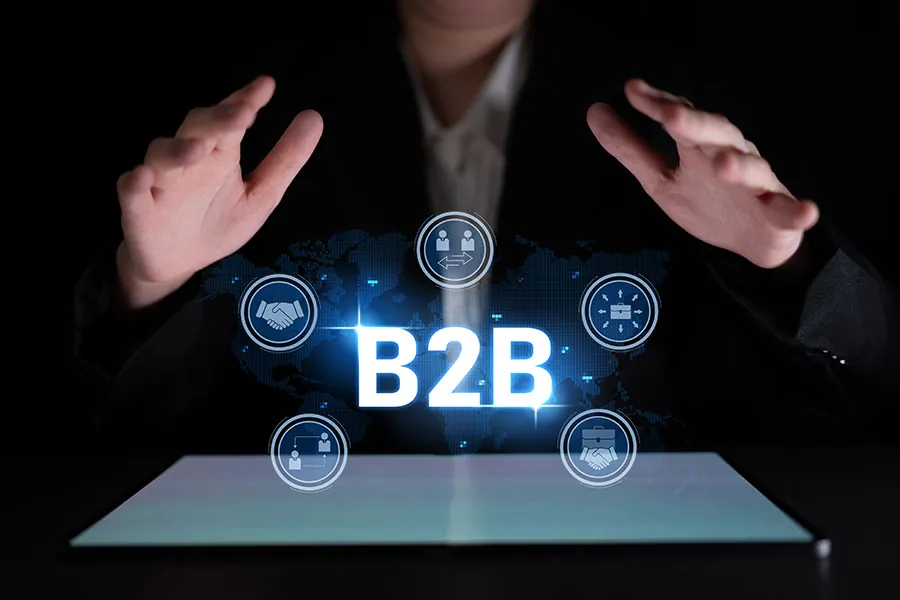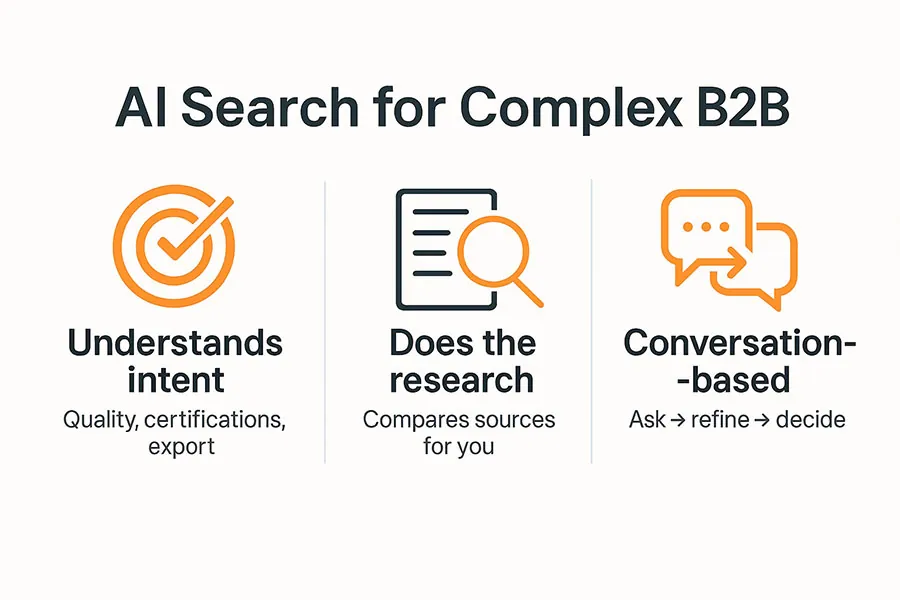The AI Search Revolution That’s Already Here: Why Manufacturers Are Missing 89% of B2B Buyers


An international buyer types a detailed query into ChatGPT: “I need an IATF 16949 certified supplier for automotive suspension control arms in Taiwan with North American market experience.” Within seconds, they have a curated list of potential partners, but your company isn’t on it.
Table of Contents
This isn’t a hypothetical scenario. It’s happening right now, and if you’re a manufacturer still relying solely on traditional SEO, you’re becoming invisible to a rapidly growing segment of B2B buyers.
The Data on AI Search That Changes Everything for Manufacturers
While SEO experts were still dismissing AI search as “too small to matter” in 2024, B2B buyers were quietly revolutionizing how they find suppliers:
- 89% of B2B buyers now use generative AI in at least one area of their purchasing process, according to Forrester’s 2024 Buyers’ Journey Survey
- 94% of procurement executives use generative AI at least once a week for sourcing decisions
- AI-generated traffic in B2B sectors has grown from 2-6% to over 40% monthly growth, with Forrester projecting it will reach 20% of total organic traffic by end of 2025
- B2B buyers are adopting AI-powered search at three times the rate of consumers
The transformation is happening faster than anyone predicted. What looked like a distant future in 2024 has become today’s reality by 2025.
Why Traditional Search Volume Data Misled Everyone
Here’s what the experts got wrong: they measured total search volume across all industries and demographics. But B2B purchasing, especially international sourcing, follows completely different patterns than consumer search behavior.
The critical difference: B2B buyers don’t search with simple keywords. They search with complex requirements, certifications, and specifications that traditional search engines struggle to handle effectively. AI search engines excel at exactly these types of queries.
This year, my digital marketing agency has received multiple high-quality inquiries from Taiwan manufacturers specifically because potential customers found us through ChatGPT searches. These weren’t tech companies or early adopters, they were traditional manufacturers seeking suppliers with specific certifications and regional experience.
The bottom line: While AI search might represent only a small percentage of total global searches, it’s becoming disproportionately important for complex B2B purchasing decisions. And if your company doesn’t show up in these results, you’re missing qualified prospects who are ready to make purchasing decisions.
How B2B Buyers Actually Search Online in 2025
Traditional Google search: “Taiwan CNC machining manufacturers”
AI search query: “I need an ISO 9001 certified CNC machining supplier in Taiwan with experience serving automotive OEMs in North America, capabilities for high-volume production runs, and competitive pricing for aluminum components.”
The difference isn’t just in length, it’s in intent, complexity, and the quality of results buyers expect.


Why AI Search Is Better for Complex B2B Queries
B2B buyers now spend 83% of their time researching independently, away from sales reps, and they’re turning to AI search engines because traditional search simply can’t handle their sophisticated requirements.
Here’s what makes AI search fundamentally different for B2B procurement:
AI search actually understands what you’re asking for. When you search Google for “Taiwan manufacturer,” you get whatever pages happen to use those words. When you ask ChatGPT “I need a reliable manufacturer in Taiwan with quality certifications who can handle international shipping,” it understands you want quality, reliability, certifications, and export capabilities, then finds companies that actually match those needs.
AI search does the research work for you. Google shows you a list of websites and expects you to click through each one to compare options yourself. AI search reads multiple sources, compares the information, and gives you a summary of the best options with explanations of why they might work for your specific situation.
AI search lets you have a conversation. With traditional search, each query starts fresh, you can’t build on previous questions. With AI search, you can start broad (“Find me manufacturers in Taiwan”) then get more specific (“Which of these has the best quality reputation?”) then even more detailed (“What’s the typical lead time for the top two options?”). It remembers the entire conversation and helps you narrow down to exactly what you need.
The Real Impact: Compressed Buying Cycles and Hidden Decisions
AI can compress buying cycles dramatically for larger companies with complex, committee-driven purchasing processes. Stakeholders can rely on AI-generated shortlists built around specified criteria.This means purchasing decisions are increasingly happening before suppliers even know they’re being evaluated.
An Example of What This Could Look Like for Your Company
Situation
A US automotive parts distributor whose current Taiwanese injection molding supplier just announced a 15% price increase.
New Approach
Instead of calling around or attending trade shows, the procurement manager opens ChatGPT and asks: “Find me five alternative injection molding suppliers in Taiwan with ISO/TS 16949 certification, automotive experience, tooling capabilities for complex geometries, and competitive pricing for medium-volume runs.”
The Result
Within a few minutes, the AI provides a detailed comparison of five suppliers, complete with their certifications, specializations, typical lead times, and recent customer feedback. The procurement manager narrows it down to two companies, requests quotes through their websites, and makes a switching decision, all before the original supplier realizes they’re at risk of losing the business.
Could This Be Your Company Next?
The Taiwan injection molding supplier in our example lost a $2 million relationship they’d held for a decade. They never knew they were being replaced until the orders stopped coming. The reason wasn’t quality issues or pricing problems, their website simply didn’t contain the specific certification details and capability descriptions that AI search engines needed to recommend them.
This isn’t a future scenario. It’s happening right now across traditional manufacturing industries.
The Evidence Is Already Here
My agency has witnessed this transformation firsthand. In 2025, we’ve received multiple high-quality inquiries from companies who found us specifically through AI search engines. These weren’t random web visitors—they were qualified prospects with complex requirements who came to us because AI systems could match their detailed needs with the comprehensive content we’ve published about our capabilities, certifications, and experience.
The difference between companies getting found and companies getting overlooked often comes down to one crucial factor: whether their website speaks the language that AI systems understand.
The Critical Moment for Manufacturers
We’re at a pivotal point. While many manufacturers are still operating with basic catalog websites from years past, their international competitors are investing in the type of detailed, professional content and SEO optimization that AI search engines prioritize.
Old-style websites with minimal text, generic descriptions, and outdated content aren’t just losing ground in traditional search, they’re becoming completely invisible to the fastest-growing segment of B2B buyers.
The manufacturers who recognize this shift and take action now will capture the business that their less-prepared competitors will never even know they lost.
Your Next Decision Matters
The question facing every manufacturer today isn’t whether AI search will impact their business, it’s whether they’ll be visible when it does.
The buyers are already there. The technology is already working. The only variable is whether your company will be found when those buyers are ready to make decisions.
In an increasingly competitive global market, can you afford to be the supplier that gets replaced without even knowing why?
Ready to ensure your company stays visible to tomorrow’s buyers? The manufacturers who adapt their digital presence now will be the ones winning business while their competitors wonder where their customers went.
If you would like to find out more about how to get your manufacturing business ready for the AI search revolution please contact us.
